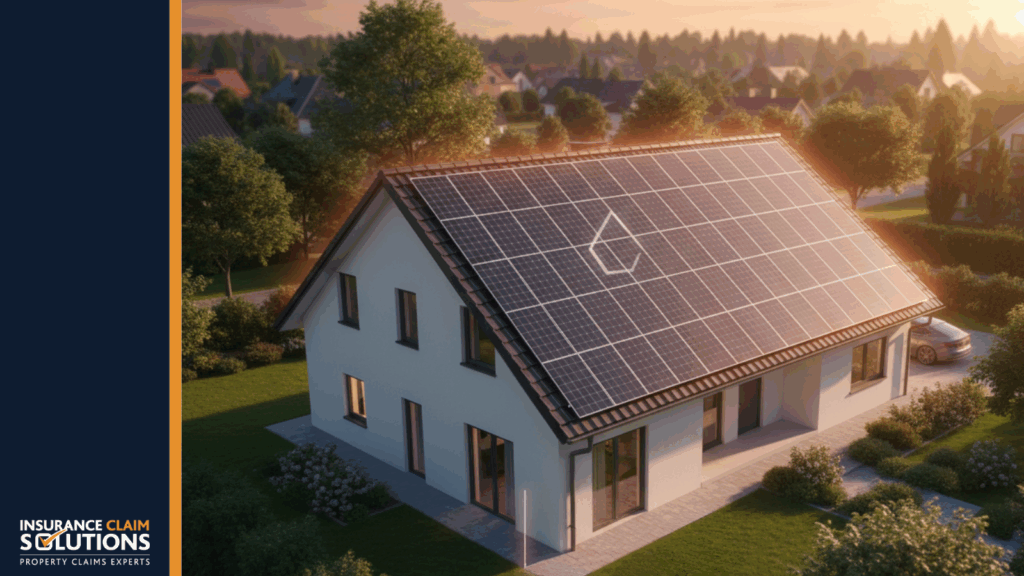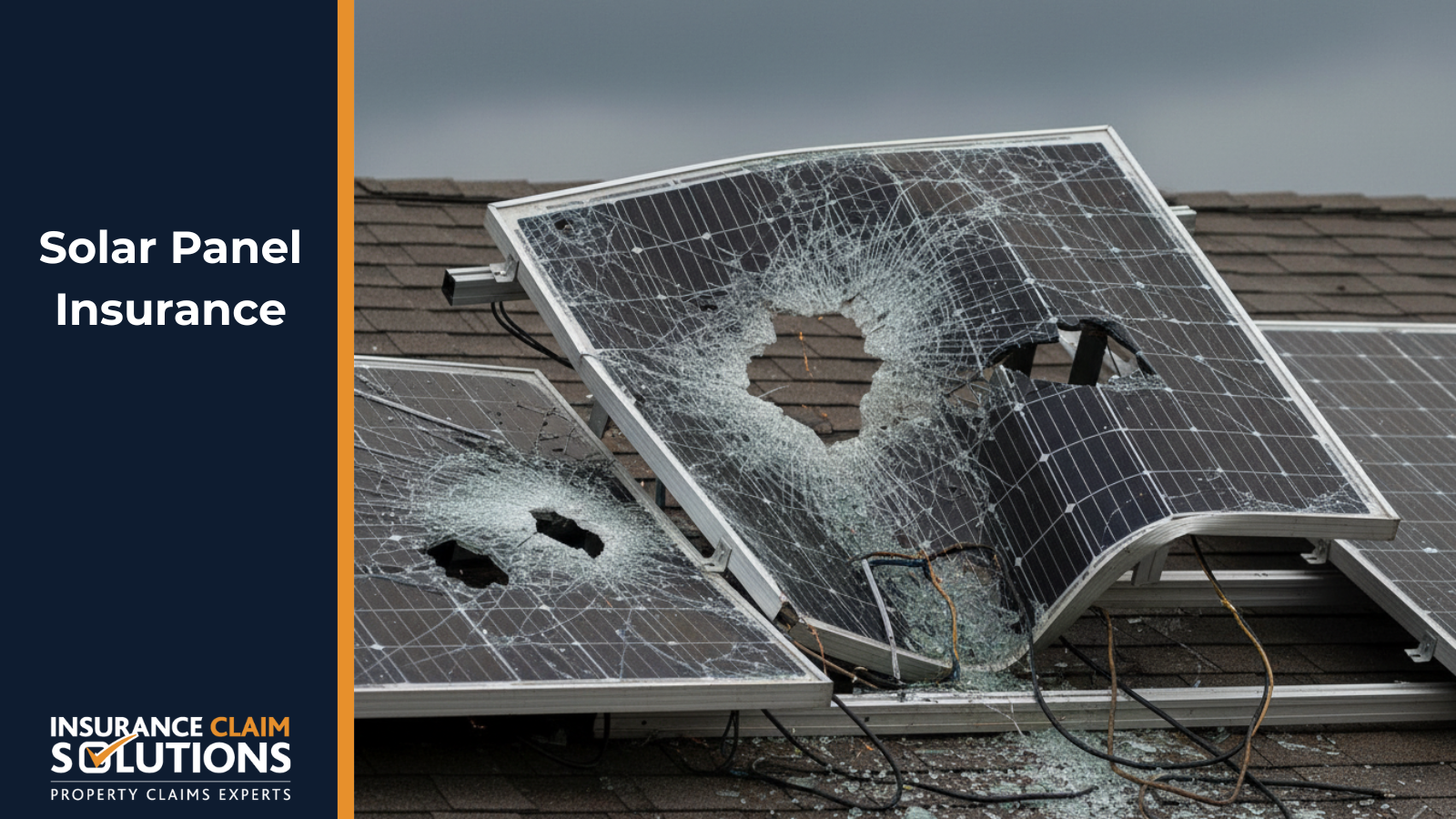Installing solar panels on your Irish home is an excellent investment in renewable energy and can significantly reduce your electricity bills. However, many homeowners don’t realize that adding solar panels to their property affects their home insurance coverage and premiums. Understanding how solar panel insurance works in Ireland ensures your investment is properly protected from day one.
This guide explains everything you need to know about insuring solar panels in Ireland, from how they affect your premiums to what happens if they’re damaged. Whether you’re planning to install solar panels or already have them on your roof, knowing your insurance obligations and options helps protect your investment

How Solar Panels Affect Your Home Insurance Premiums
When you install solar panels, your home insurance premium typically changes to reflect the increased value of your property. Solar panels represent a significant investment, often costing €6,000-€15,000 or more depending on system size, and this added value needs appropriate insurance coverage.
Most Irish insurance providers view solar installations as improvements to your home’s structure, which increases the property’s overall value. Your building insurance sum insured should increase to cover the replacement cost of both your home and the solar installation. If you’re underinsured and need to make a claim, the average clause in your policy could reduce your payout proportionally.
The impact on your premium depends on several factors. The size of your system matters, as a larger installation with more panels represents greater value requiring higher coverage. Whether you’ve added battery storage also affects premiums, as these expensive components need protection. The type of installation influences risk assessment too – roof-integrated systems differ from rack-mounted panels in terms of potential issues.
Interestingly, some insurers offer favorable terms for homes with solar panels. They recognize that homeowners who invest in renewable energy tend to maintain their properties well and represent lower-risk customers. The energy efficiency improvements can work in your favor when negotiating coverage.

Are Solar Panels Covered by Standard Home Insurance?
Solar panels permanently attached to your roof are generally covered by your building insurance policy, treated similarly to other fixtures like your roof tiles or windows. Once installed, they become part of your home’s structure rather than separate items requiring special coverage.
Your building insurance typically covers solar panels against standard insured perils listed in your policy. This usually includes storm damage (common in Ireland’s weather), fire, theft, vandalism, lightning strikes, and damage from falling objects like tree branches. If a storm tears panels from your roof or a falling branch damages them, your building insurance should cover repairs or replacement.
However, standard policies don’t cover everything. Mechanical breakdown, gradual wear and tear, or damage from poor maintenance typically falls outside coverage. If your panels stop working due to age or component failure rather than a specific insured event, you’ll need to rely on manufacturer warranties rather than insurance. Similarly, damage caused by faulty installation usually requires action against the installer rather than an insurance claim.
It’s crucial to inform your insurance provider when you install solar panels. Failing to notify them of this significant change to your property could result in claims being rejected or your policy being voided. Most insurers require notification before or immediately after installation to ensure coverage is properly adjusted.

What Type of Insurance Coverage Do Solar Panels Need?
Standard home building insurance typically provides adequate coverage for most residential solar installations in Ireland. Once panels are permanently attached to your roof, they’re covered as part of your building’s structure under your existing policy, though you’ll need to increase your sum insured to reflect their value.
Contents insurance doesn’t usually apply to fixed solar installations, as they’re considered part of the building rather than movable contents. However, if you have portable solar panels that aren’t permanently installed, contents coverage might be more appropriate.
Some homeowners with expensive or specialized systems consider additional coverage beyond standard building insurance. Solar thermal systems, which are typically more complex than standard photovoltaic panels, might benefit from specialist coverage. Similarly, if you’ve invested in premium panels or extensive battery storage systems, specialist renewable energy insurance could provide more comprehensive protection.
Public liability coverage becomes relevant if you’re generating electricity and feeding it back to the grid under schemes like the Microgeneration Support Scheme. Whilst your home insurance might provide some liability coverage, checking the specifics ensures adequate protection if issues arise with your system.

When to Notify Your Insurance Provider
Contact your insurance provider before installation begins, ideally at least 30 days ahead of scheduled work. This advance notice gives your insurer time to adjust your policy, update your sum insured, and confirm coverage details before the panels go on your roof.
When notifying your insurer, provide comprehensive information about the installation. They’ll want to know the total cost of the system including installation, the number and type of panels being installed, whether battery storage is included, and who’s performing the work. Using certified installers registered with SEAI (Sustainable Energy Authority of Ireland) often reassures insurers about installation quality.
If you’re availing of the SEAI solar panel grants, mention this to your insurer. Whilst the grant reduces your out-of-pocket costs, the full system value needs insurance coverage. The replacement cost after damage would be the full market value, not just what you paid after grants.
Don’t assume your existing policy automatically covers new solar panels at their full value. Even if coverage extends to them, your sum insured likely needs increasing to reflect the additional property value. This increase in coverage will affect your premium, so budget accordingly when planning your solar investment.

Future-Proofing Your Solar Insurance
Solar technology evolves rapidly, and your insurance needs to keep pace. Review your coverage annually, particularly after any changes to your installation. Adding panels, upgrading your inverter, or installing batteries all require insurance updates.
Stay informed about changing Irish regulations and grant schemes affecting solar installations. The Microgeneration Support Scheme and other initiatives might affect insurance requirements or coverage options. As more Irish homes install solar systems, insurance products will likely evolve to better serve this market.
Consider how future home improvements might interact with your solar installation. If you’re planning roof work, extensions, or other modifications, these could temporarily or permanently affect your panels. Notify your insurer about such changes to ensure continuous coverage.
Climate change brings increasingly severe weather to Ireland, potentially affecting solar installation risks. Ensure your coverage remains adequate for Ireland’s changing weather patterns, and consider whether additional protection against specific weather-related risks might be worthwhile.
Getting Professional Help with Insurance Claims
If you experience damage to your solar installation and need to make an insurance claim, professional assistance can help ensure proper handling. Insurance Claim Solutions provides expert support for all types of property damage claims throughout Ireland, including those involving renewable energy installations.
Our team understands the complexities of property damage claims and can help ensure your solar system damage is properly assessed, documented, and claimed. We handle communication with your insurer, coordinate with solar installation specialists, and work to help ensure your claim reflects the true cost of repairs or replacement.
Contact us at 086 053 9137 or email info@insuranceclaimsolutions.ie for a free consultation about any property insurance claim, including those involving solar panel damage.
Need Help with Your Insurance Claim?
Expert loss assessors working exclusively for you
Contact Insurance Claim Solutions Today!
No Win – No Fee Basis
We work exclusively for you, not the insurance company
Regulated by the Central Bank of Ireland
Citations
- Central Bank of Ireland insurance guidance relating to solar panels and home insurance
- Irish home insurance policy coverage specifics for solar PV systems
- Homeowner obligations and specialist solar panel insurance options in Ireland
For more information, please contact gov.ie and citizensinformation.ie

